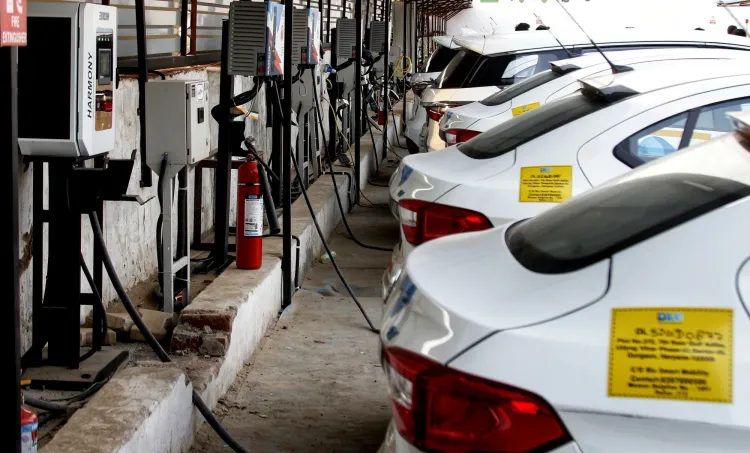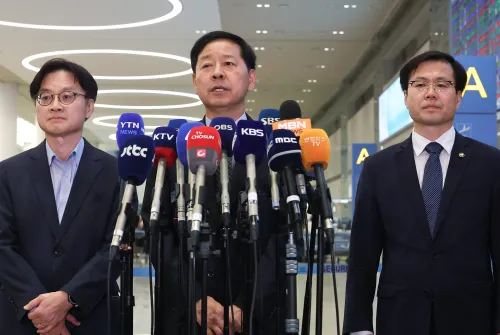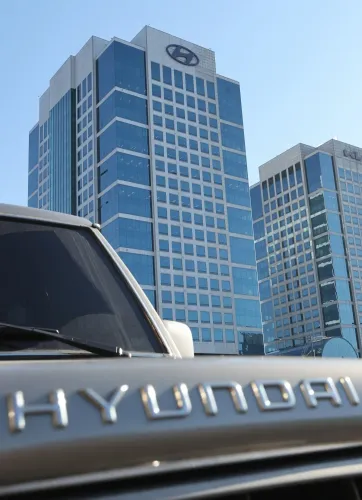India Achieves 28.55 Lakh Registered Electric Two-Wheelers and 2.57 Lakh Electric Four-Wheelers: Government Update

New Delhi, Dec 10 (NationPress) The current tally of registered electric two-wheelers in India has reached 28,55,015, alongside 2,57,169 electric four-wheelers as per the latest data shared in Parliament on Tuesday.
According to the Vahan portal managed by the Ministry of Road Transport and Highways, the state of Odisha registers a total of 1,45,479 electric vehicles (EVs), showing an adoption rate of 1.24 percent, as reported by Minister of State for Heavy Industries and Steel, Bhupathiraju Srinivasa Varma, in a written response to the Lok Sabha.
Currently, the Ministry of Heavy Industries does not have any proposals in the pipeline for establishing an auto research and development cluster in Odisha, the minister clarified.
To encourage the adoption of EVs, consumers are provided with various incentives through government initiatives, such as the Faster Adoption and Manufacturing of (Hybrid &) Electric Vehicles in India (FAME India) Scheme.
This scheme extends over a span of five years starting from April 1, 2019, with an overall budget support of Rs 11,500 crore. It facilitates incentives for e-2Ws, e-3Ws, e-4Ws, e-buses, and EV public charging stations.
Additionally, the Production-Linked Incentive (PLI) scheme designated for the automobile and auto component sector in India (PLI-Auto) has a financial allocation of Rs 25,938 crore.
This initiative aims to provide financial incentives to enhance domestic manufacturing of AAT products with a minimum of 50 percent Domestic Value Addition (DVA) and attract investments within the automotive manufacturing value chain.
The PLI initiative for Advanced Chemistry Cell (ACC) has received approval with a budget of Rs 18,100 crore. This scheme focuses on building a competitive domestic manufacturing ecosystem for 50 GWh of ACC batteries.
Another significant initiative is the PM Electric Drive Revolution in Innovative Vehicle Enhancement (PM E-DRIVE) Scheme, which has a financial outlay of Rs 10,900 crore and was announced on September 29, 2024. This two-year scheme intends to support various electric vehicles, including e-2Ws, e-3Ws, e-Trucks, e-buses, e-Ambulances, EV public charging stations, and the enhancement of testing agencies.
The Scheme for Promotion of Manufacturing of Electric Passenger Cars in India (SPMEPCI) was introduced on March 15, 2024, to boost the production of electric cars in India.
This initiative requires interested applicants to invest a minimum of Rs 4,150 crore and attain a minimum DVA of 25 percent by the end of the third year and 50 percent by the end of the fifth year.
The Ministry of Finance has also reduced the Goods and Services Tax (GST) on EVs from 12 percent to 5 percent. Furthermore, the Ministry of Road Transport and Highways (MoRTH) has announced that battery-operated vehicles will be issued green licence plates and will be exempt from permit requirements.
MoRTH has also issued a notification to states, advising them to forgo road tax on EVs, which will help in lowering the initial costs associated with EVs.
Moreover, the Ministry of Housing and Urban Affairs has revised the 'Model Building Bye-Laws', mandating the inclusion of charging stations in both private and commercial buildings.









